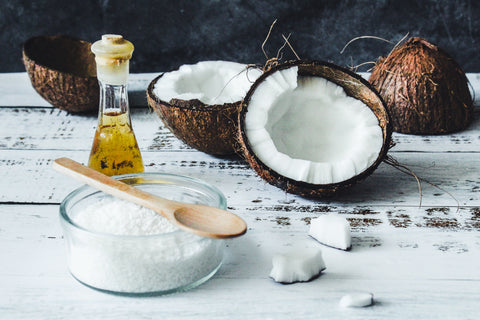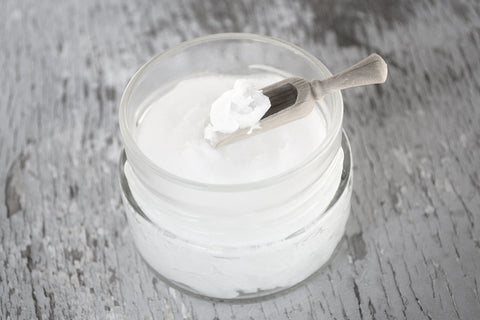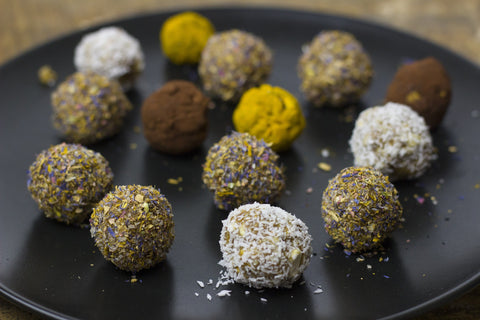
MCT Oil vs. Coconut Oil: What's the Difference?
Both coconut oil and MCT oil have gained prominence in recent years due to their shared and separate health benefits. Coconut oil has been used in cooking and in skin and hair care for years but has more recently been used to supplement diets. MCT oil has become popular as a supplement, particularly for those interested in fitness and athletic performance.
MCT oil's popularity may be linked to the keto diet and its purported ability to help you lose weight. MCT oil and coconut oil are both popular on this diet due to their ability to increase ketone production in the liver.
Both oils have similar benefits in terms of how they affect the body and how they are used, but there are some differences between them too. We've been taking a look at MCT oils and coconut oil and how they are used as well as their differences. To find out more, keep reading this blog post!

What are medium chain triglycerides (MCTs)?
Medium-chain triglycerides, or MCTs, are a type of saturated fat. This kind of saturated fat is found naturally in coconut oil and palm kernel oil and is usually extracted from these oils to become MCT oil.
The triglycerides found in MCTs contain three fatty acids and one glycerol molecule. MCTs are quite unique in the world of dietary fat because most dietary sources of fat are actually long-chain triglycerides. Medium-chain triglycerides are broken down differently in the body differently to long-chain triglycerides. Rather than needing bile for the breakdown, MCTs go straight to the liver and are broken down into energy or ketones. Ketones can be used for energy in place of glucose/sugar, meaning MCTs offer a dose of immediate energy to the body.
What is coconut oil?
Coconut oil is an oil produced from the fruit of the coconut palm tree. It contains lots of nutrients including vitamin E and polyphenols, as well as MCTs. These nutrients contribute to good cognitive function, metabolism, good hair and good skin.
How are MCT oil and coconut oil linked?
The main link between MCT oil and coconut oil is that MCTs are found in coconut oil. Most MCT oil is derived from either coconut oil or palm oil. To get MCT oil from these two kinds of oil, the oils undergo a process called fractionation which separates the MCT oil from the rest of the oil and concentrates it into pure MCT oil.
The MCT oil in coconut oil makes up about 15% so, while it's not a total substitute, coconut oil can be used as a way to get medium-chain fatty acids into your system.
Benefits of MCT oil and coconut oil
MCT oil and coconut oil are incredibly popular in the health food industry because of their multitudinous benefits. Below we've summarised the kind of benefits you'll get when you try one of these oils in your diet.
MCT oil
The benefits of MCT oil include:
- Promoting healthy weight loss - Research has shown that there is some correlation between using MCT oil as a dietary supplement and healthy weight loss. MCT oil is thought to increase the hormones that promote feelings of fullness in our body, helping to reduce overeating. In addition, MCT oil is known to increase ketones in our body and ketones help body fat to be burned in our body as energy when carbohydrate intake is low (this is the basis of the keto diet.)
- It's a good energy source - MCT oil is a fantastic source of immediate energy. Because the body can absorb medium-chain triglycerides much quicker than long-chain fatty acids, MCTs head straight for the liver and no bile is needed to break them down. This means the fatty acids are converted quickly to energy (or ketones) for use by the body. This is one of the reasons that athletes may choose to use MCT oil pre-workout.
- Reducing lactate buildup and helping use fat for energy - Taking MCT oil before a workout can help to prevent lactate buildup in the muscles. This means that you should be able to work out for longer, boosting your endurance. MCT oil also promotes the burning of fat during workouts, though the studies have mixed results.
- May help manage some conditions - There is evidence to suggest that MCT oil is beneficial in helping to manage conditions like epilepsy, Alzheimer's disease, and autism. In epilepsy, the ketones MCT oil promotes are thought to reduce the frequency of seizures and for Alzheimer's the ketones may give the brain another energy source as the disease impairs the ability to use sugar in the brain.
- Fights yeast and bacterial growth - MCT oil is thought to have antimicrobial and antifungal effects, meaning it can help the body to fight off these microbes as they enter the body and prevent any illness they cause.
- May reduce risk factors for heart disease - A huge risk factor for heart disease is obesity. As MCT oil promotes healthy weight loss, it is thought that it may reduce the chances of developing the condition in some people.
- Helps to manage blood sugar levels - MCT oil is thought to help manage the levels of sugar in our blood. This is particularly helpful for those with diabetes and could help to manage this condition.

Coconut oil
Coconut oil comes with lots of benefits too and is used both in people's diets and topically on skin and hair. The benefits of coconut oil include:
- Weight loss - Lauric acid, which is the main fatty acid in coconut oil, is quickly metabolised when ingested and though it is saturated fat, it is a healthy fat. Lauric acid is thought to be good for heart health too and acts as a strong antimicrobial.
- Improved skin and hair health - Used topically, coconut oil has lots of benefits for the skin and hair. It is deeply moisturising for the skin and can reduce redness as well as protect the skin and provide a tonne of antioxidants that help with the signs of aging. For your hair, coconut oil helps to tame frizz, repair damaged hair and protect the hair from pollutants in the air.
- Boosts good cholesterol - Coconut oil is thought to reduce the amount of LDL cholesterol (bad cholesterol) and raise the amount of good cholesterol in your system.
- Improved brain function - Like with MCT oil, coconut oil is thought to improve brain function and help to reduce symptoms of diseases like Alzheimer's.
- Reduces stress - Antioxidant compounds in coconut oil have shown some evidence of helping to reduce levels of stress and other mental health disorders.
When choosing a coconut oil to try out, always opt for virgin coconut oil to ensure that you get all of the unrefined goodness it offers.
Uses of MCT oil and coconut oil
Both MCT oil and coconut oil contain healthy fats, and though they are saturated fats, getting them into your diet is a good idea. Coconut oil consumption has increased in recent years, along with the increase of MCT oil as a dietary supplement. Below we've listed a few of the ways that each oil is used.
MCT oil
MCT oil is usually most used as a dietary supplement. It comes in both oil and powdered form. When it comes to the oil form, there are a number of ways that you can take it. It can be taken as it is or added to other liquids. Many people add it into coffee or tea to give themselves a boost in the morning. You can also add it to smoothies and in cooking and baking.
For powdered MCT oil, there are a number of ways you can consume it. Along with the usual, like adding it to smoothies and hot drinks, you can also use it into baked goods, add it into yogurts, and use it as a topping on pancakes and waffles at breakfast!
Coconut oil
Coconut oil is very popular as a cooking oil and is particularly good for fillings as it is solid at room temperature. Though olive oil can offer lots of healthy unsaturated fats, coconut oil is another healthy cooking oil that is found in many recipes.
Coconut oil, when not being used as an oil to cook with, is also frequently used in baking, particularly in baked goods designed for those on more restrive diets like the keto diet and vegan diets. Coconut oil may also be added to smoothies as a dietary supplement.
Aside from ingesting coconut oil, it is also great for hair and skin. It can be applied as a moisturiser to skin, or as a base for an exfoliant. For the hair, you can wear it as a hair mask, use it on damp hair after washing, and as a treatment on dry hair.

Dangers of MCT oil and coconut oil
When it comes to both oils, as with anything overconsumption can lead to some negative side effects. These side effects differ for everyone and for each kind of oil. It is important to note that both oils can be used safely and according to the directions of the packaging. Supplements work differently in different bodies so the effect may not always be the same.
Possible side effects of MCT oil
The possible negative side effects of MCT oil include:
- Increase in "bad cholesterol" - This has been found to happen in some people. While others find a reduction in bad cholesterol happens when they begin using MCT oil as a supplement, some people can find that their bad cholesterol levels actually increase.
- Heart palpitations - Some people who have taken MCT oil have reported having heart palpitations while supplementing.
- Upset stomach - A very common side effect, MCT oil use can lead to an upset stomach and diarrhea.
- Increase levels of hunger hormones - Some people may find that an increase in MCT oil use can increase the levels of the hunger hormone ghrelin, meaning that you may be more prone to overeating as you feel more hungry more often.
- May lead to fat build-up in the liver - There is evidence to suggest that increased use of MCT oil can actually lead to a build-up of fat in the liver.
Possible negative side effects of coconut oil
Because of their similarities in composition, some of the negative side effects of coconut oil are also negative side effects of consuming too much coconut oil. The side effects of coconut oil are:
- Could raise bad cholesterol levels - Just like MCT oil, there is a danger of raising bad cholesterol levels with the consumption of too much coconut oil.
- May consume too many calories - As with all oil consumption, you should stick to recommended measurements as overconsumption can increase your caloric intake for the day. This could lead to weight gain and increased risk of certain chronic diseases.
- Can cause diarrhea - Some people find that the consumption of too much coconut oil can lead to diarrhea.
For both MCT and coconut oil, you will find that lower doses of both can help to subdue any symptoms you have been experiencing. If side effects persist stop use immediately.
Interesting ways to incorporate MCT and coconut oil into your diet
We've suggested some popular ways of using both of these oils, from adding to hot drinks to using as cooking oil, but there is a tonne of other ways you can add these beneficial oils into your diet.
- "Fat bombs" - This is very popular with ketogenic diet enthusiasts. There are many recipes and most are reminiscent of low carb versions of peanut butter cups.
- "Bulletproof" turmeric latte - Turmeric lattes are really popular now due to the health benefits of the turmeric root. To make a bulletproof turmeric latte, make it as direct and then add a dose of MCT oil.
- Salad dressings - Oil is a common component of many salad dressings, so why not add a small amount of MCT oil to elevate your salad.
- Homemade chocolate bars - This is another great idea for those following the keto diet, creating low carb chocolate bars using MCT oil is a tasty way to get this beneficial oil into your diet.
Recipes for MCT oil-based treats are huge on the internet so finding an incredible way to add it into your diet is going to be really easy!

Final thoughts
Both MCT oil and coconut oil can have incredible benefits for your health. Both contain medium-chain triglycerides that are good for an immediate dose of energy. They are broken down easily by the body and produce energy or ketones.
Both oils have been linked to healthy weight loss, increased energy, and a decrease in levels of LDL cholesterol. Coconut oil contains MCTs which makes it a good source, but MCT oil is the purest form you can find.
We offer a tonne of different MCT and coconut oil products, check them out today.
Frequently Asked Questions
Which is better MCT oil or coconut oil?
MCT oil and coconut oil are similar in composition but are not the same thing. Both have benefits and both can be used for different things. Their similarities lie in the abundance of MCTs in both. MCT oil is usually derived from coconut oil. If you are wanting to up your intake of MCTs, then MCT oil is always the best option. It's the most concentrated form of MCTs you can find and so the best option. If you want a cooking oil or a topical treatment for hair or skin, then coconut oil may be the better option.
Can I replace MCT oil with coconut oil?
If you are using coconut oil for its high levels of MCTs then MCT oil is a good substitution as it is a purer form of MCTs and therefore less is needed. But if you are using coconut oil as a cooking ingredient, or for a moisturising and protective treatment for hair and skin, the MCT oil may not be the best substitution. MCT oil can be used in certain baked goods and meals like pancakes and chocolate bars, it can also be added to hot drinks like coffee and tea.
What are the negative effects of MCT oil?
MCT oil is generally safe for consumption but overconsumption can lead to some negative side effects, including diarrhea, upset stomach, and a build-up of fat in the liver. Some users of MCT find that instead of reducing levels of bad cholesterol, their levels actually increase. This could increase the risk of certain chronic conditions if it persists.
Is MCT oil just coconut oil?
MCT oil is derived from either coconut oil or palm kernel oil. Both of these oils have high levels of medium-chain triglycerides and to extract them, the oils undergo a process called fractionation which isolates and concentrates the MCTs into a pure form: MCT oil. Though you can use coconut oil to up your MCT intake, MCT oil is not the same as coconut oil. MCT oil tends to be used as a supplement but coconut oil is used for cooking as well as for your skin and hair.

Leave a comment